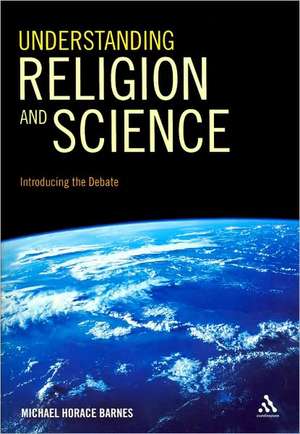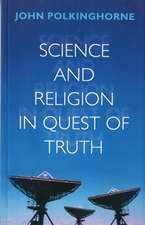Understanding Religion and Science: Introducing the Debate
Autor Professor Michael Horace Barnesen Limba Engleză Paperback – 24 mar 2010
Most texts on religion and science rightly focus on the effect of modern cosmology and biology on views about God and on the place of humankind in the universe. Many analyze current disputes about Intelligent Design. Some add useful material about notions the soul and inner freedom. A few offer thoughts about miracles. Others devote time to differences in methods in religion and science. Understanding Religion and Science covers all those topics well and clearly.
This textbook also reviews relevant historical and philosophical background, showing, for example, that some ancient Christians speculated on how God might give order to history without having to intervene, or that the very earliest Christians did not believe in a naturally immortal soul.
Finally, the text asks why people differ in their basic commitments, some giving priority to a religiously meaningful life, others willing to face even the most uncomfortable conclusions. The author suggests this may be a divide not easily bridged..
This book will appeal to students of Religion and of Science and Religion Studies.
This textbook also reviews relevant historical and philosophical background, showing, for example, that some ancient Christians speculated on how God might give order to history without having to intervene, or that the very earliest Christians did not believe in a naturally immortal soul.
Finally, the text asks why people differ in their basic commitments, some giving priority to a religiously meaningful life, others willing to face even the most uncomfortable conclusions. The author suggests this may be a divide not easily bridged..
This book will appeal to students of Religion and of Science and Religion Studies.
Preț: 261.17 lei
Preț vechi: 297.30 lei
-12% Nou
Puncte Express: 392
Preț estimativ în valută:
49.97€ • 52.33$ • 41.45£
49.97€ • 52.33$ • 41.45£
Carte tipărită la comandă
Livrare economică 09-23 aprilie
Preluare comenzi: 021 569.72.76
Specificații
ISBN-13: 9781441118165
ISBN-10: 1441118160
Pagini: 320
Ilustrații: Illustrations
Dimensiuni: 168 x 241 x 20 mm
Greutate: 0.54 kg
Ediția:New.
Editura: Bloomsbury Publishing
Colecția Continuum
Locul publicării:London, United Kingdom
ISBN-10: 1441118160
Pagini: 320
Ilustrații: Illustrations
Dimensiuni: 168 x 241 x 20 mm
Greutate: 0.54 kg
Ediția:New.
Editura: Bloomsbury Publishing
Colecția Continuum
Locul publicării:London, United Kingdom
Caracteristici
Includes accounts of traditional and modern theologies, where these have an impact on the relations between religion and science, and examines the methods used in both science and religion, to help the reader identify and analyse their own presuppositions and processes.
Cuprins
Introduction
Section One - Methods in Religion: Relations Between Faith and Reason
1. Faith and Reason in Religion: Some Basics
2. Modern Theologies about Faith
Section Two - The Method of Science: How Does It Arrive at Its Conclusions?
3. The Method of Science
4. The Limits of Science
5. Criticisms of Science
Section Three - God and Atheism
6. The Reality and Nature of God in Western Religion
7. Science-Based Atheism and Some Religious Responses
Section Four - Miracles: Does God Intervene in Natural Processes?
8. Belief in Miracles Today
9. A Brief History of Christian Thought on Miracles
10. Skepticism and Modern Theologies about Miracles
Section Five - Cosmic Evolution: How Did We Get Here?
11. Varieties of Universes
12.. Cosmic Order
13. Religious Interpretations of the Cosmos
Section Six - Biological Evolution: How Did We Get Here?
14. Basic Theories of Evolution
15. Evolution and Christianity
16. The New Creationism: Intelligent Design
Section Seven - Human Nature: Who Are We?
17. The Soul Tradition
18. Science on the Mind
19. The Freedom of a Material Soul
Epilogue
20. Religion and Science: Conflicting Commitments
Bibliography
Section One - Methods in Religion: Relations Between Faith and Reason
1. Faith and Reason in Religion: Some Basics
2. Modern Theologies about Faith
Section Two - The Method of Science: How Does It Arrive at Its Conclusions?
3. The Method of Science
4. The Limits of Science
5. Criticisms of Science
Section Three - God and Atheism
6. The Reality and Nature of God in Western Religion
7. Science-Based Atheism and Some Religious Responses
Section Four - Miracles: Does God Intervene in Natural Processes?
8. Belief in Miracles Today
9. A Brief History of Christian Thought on Miracles
10. Skepticism and Modern Theologies about Miracles
Section Five - Cosmic Evolution: How Did We Get Here?
11. Varieties of Universes
12.. Cosmic Order
13. Religious Interpretations of the Cosmos
Section Six - Biological Evolution: How Did We Get Here?
14. Basic Theories of Evolution
15. Evolution and Christianity
16. The New Creationism: Intelligent Design
Section Seven - Human Nature: Who Are We?
17. The Soul Tradition
18. Science on the Mind
19. The Freedom of a Material Soul
Epilogue
20. Religion and Science: Conflicting Commitments
Bibliography
Index
Recenzii
"This is a most impressive work by a recognized expert in science and religion. It is filled with genuine learning in natural science, Western theology, and world religions. Barnes work is informed by a vast amount of reading and research, but it is eminently readable and should appeal to a wide spectrum of potential readers, including not only students, scholars, and teachers, but also educated general readers. This innovative study is very well-written, comprehensive, and beautifully organized. From beginning to end it remains consistently interesting, provocative, and fair. I wish it had been available to me when I was teaching courses on science and religion." - John F. Haught, Woodstock Theological Center, USA
"Understanding Religion and Science makes a significant contribution to the growing field of Science and a Religion by examining major questions about the relations of the two with attention to their respective goals and methods, and with exploration about where they might meet. Although Michael A. Barnes self-identifies as a theologian, the book would be a good choice not only for a Theology course but also for Religious Studies courses." - Anne M. Clifford, Msgr. James Supple Chair of Catholic Studies, Iowa State University of Science and Technology, USA
'[It] introduces the debate clearly and in detail (without forcing a view of either belief or atheism)' Church Times, 23rd July 2010
'Michael Barnes's introduction to the debate carefully and systematically lays out the self-understanding of many in the scientific and religious communities in ways that make them comprehensible to the layman but in a sophisticated manner that will satisfy many who have been thinking about these issues throughout their lives.'
Barnes offers a very helpful analysis of contemporary interactions... The book is well-written, historically informed and presents multiple points of view fairly.
One rarely gets an overview that is fair to all sides. The best feature of Barness' book is that... it manages to bring together these different perspectives in a single book in a readable way.
"Understanding Religion and Science makes a significant contribution to the growing field of Science and a Religion by examining major questions about the relations of the two with attention to their respective goals and methods, and with exploration about where they might meet. Although Michael A. Barnes self-identifies as a theologian, the book would be a good choice not only for a Theology course but also for Religious Studies courses." - Anne M. Clifford, Msgr. James Supple Chair of Catholic Studies, Iowa State University of Science and Technology, USA
'[It] introduces the debate clearly and in detail (without forcing a view of either belief or atheism)' Church Times, 23rd July 2010
'Michael Barnes's introduction to the debate carefully and systematically lays out the self-understanding of many in the scientific and religious communities in ways that make them comprehensible to the layman but in a sophisticated manner that will satisfy many who have been thinking about these issues throughout their lives.'
Barnes offers a very helpful analysis of contemporary interactions... The book is well-written, historically informed and presents multiple points of view fairly.
One rarely gets an overview that is fair to all sides. The best feature of Barness' book is that... it manages to bring together these different perspectives in a single book in a readable way.











